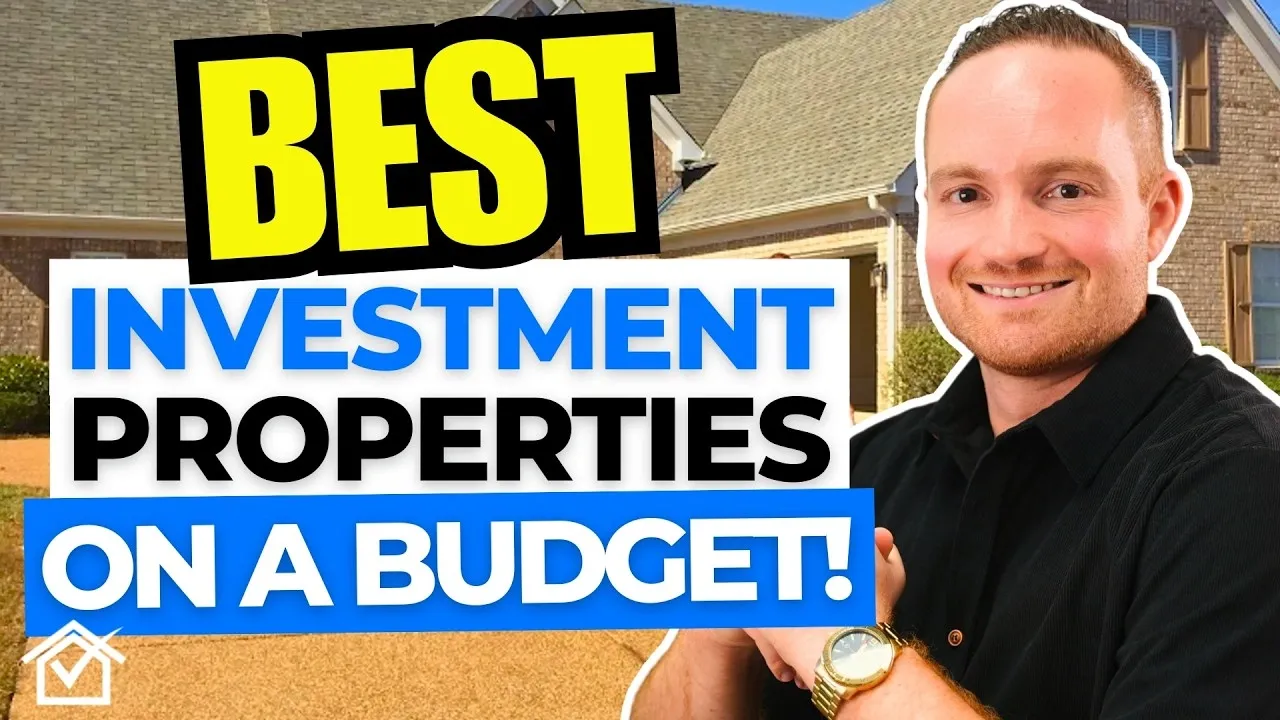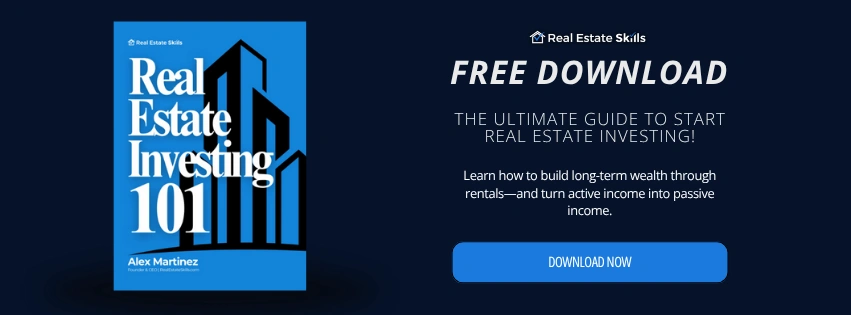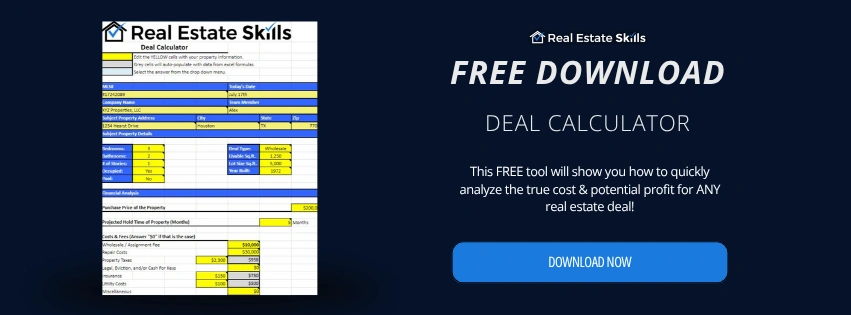BEST Types Of Investment Property For Investors (On A Budget)!
Dec 30, 2025
Every serious investor knows this truth—there are always opportunities out there, no matter what the market’s doing.
If you're just getting started, now’s the time to get clear on your goals. Where do you want to buy? What city, what state, and what kind of market make sense for your strategy? More importantly, what’s the best type of investment property for you to start with? These are the questions that will shape your first deal—and your long-term success.
- Choosing the Right Market for Investment
- Property Types: Cash Flow vs Appreciation
- Setting a Budget and Getting Pre-Qualified
- Real Estate Investment Strategies (Rentals, House Hacking, BRRRR)
- Understanding Deal Terms and Negotiation
- Best Types of Investment Property for Investors
- Defining Your Real Estate Investment Goals
- Calculating Your Financial Freedom Number
- Cash Flow vs Appreciation Strategy
- Creating Your Personal Investment Criteria
If you’re serious about doing your first real estate deal, don’t waste time guessing what works. Our FREE Training walks you through how to consistently find deals, flip houses, and build passive income—without expensive marketing or trial and error.
This FREE Training gives you the same system our students use to start fast and scale smart. Watch it today—so you can stop wondering and start closing.
Choosing the Right Market for Investment
Do you want to own real estate right in your backyard? We generally recommend starting in your local area—if it makes sense and you can afford to do it.
Also, consider whether where you live is a growth market. Are jobs moving in? Are people relocating there? Is it a desirable place to live?
If you're in a very rural area without much development, rehab, or investment activity, then you may want to look for the next closest city with at least 20,000 to 50,000 people.
If that's still not an option, you might consider long-distance or out-of-state investing.
I bought my first several rental properties out of state—mainly because I couldn’t afford a down payment in my local Southern California market, and I wasn’t able to find deals that immediately cash flowed.
Property Types: Cash Flow vs Appreciation
You’ll typically find higher cash flow properties in the middle of America and the Midwest.
On the other hand, coastal cities tend to offer higher appreciation.

Setting a Budget and Getting Pre-Qualified
You also want to consider what type of property you want to buy. Is it single-family, multifamily, or some type of commercial property?
Think about your price point too. What can you actually afford? Getting pre-qualified with a lender can help answer that.
Understanding your target market will help you determine what price point makes sense. Just because you can afford a million-dollar property doesn’t mean you should buy one. Maybe buying four $250,000 homes provides the highest ROI for your market.
You really won’t know until you start analyzing deals.
Real Estate Investment Strategies (Rentals, House Hacking, BRRRR)
As you define your investment criteria, you also need to define the strategy you want to implement. There are a lot of shiny objects in real estate, so it’s important to stay focused on what makes sense for you.
There are long-term rentals—where you're renting to a tenant for 12 months or more. Then there are short-term rentals—nightly or weekly stays that can produce higher revenue, but require more hands-on work. It's more like running a business, so it’s not as passive.
Medium-term rentals fall somewhere in between, with tenants staying 30 to 90 days.
Maybe you’re looking to do a house hack, where you live in the property while renting out a portion of it to help support the mortgage. Eventually, you move out and do it again. This is a great strategy—especially if you’re already paying rent.
Why keep paying rent to someone else when you can apply that money to your own property and start building equity?
You might also consider buying a distressed asset—rehabbing it to increase the value, then refinancing or selling it. This is what we call the BRRRR method: Buy, Rehab, Rent, Refinance, Repeat.
Understanding Deal Terms and Negotiation
In addition to your criteria, you’ll need to understand your terms.
Terms include everything about how you buy the property: price, down payment, financing, closing costs—basically, everything that’s negotiable in a real estate deal.
As you begin analyzing opportunities using the strategies we teach at Real Estate Skills, you’ll start seeing deals everywhere.
But not all deals are the right fit for your personal portfolio.
Best Types of Investment Property for Investors
Residential vs Commercial Property Types
There are many types of income-producing real estate, generally falling into two categories: residential and commercial.
Residential real estate includes single-family homes, duplexes, triplexes, and quadplexes. Once you get into properties with five or more units, that’s considered commercial.
Commercial real estate is a broad category—it includes hotels, office buildings, retail centers, shopping malls, self-storage, industrial buildings, data centers, and more.
Why Start with Single-Family Homes?
When I bought my first rental property, I chose a single-family home for a few key reasons.
First, it was a more relatable asset. I’d lived in single-family homes, and you probably have too. It felt less intimidating.
Second, managing fewer units at once was much easier than jumping into a large apartment building.
Third, the market I invested in had mostly single-family homes, so there weren’t many multifamily properties to choose from.
And finally, financing for single-family homes tends to be some of the most favorable in real estate. You can get great leverage and interest rates on them.
Plus, there are more potential buyers—both owner-occupants and other investors—when it comes time to sell. So I had more options when I eventually exited the property.
Read Also: How To Start A Rental Property Business: A Step-By-Step Guide
Defining Your Real Estate Investment Goals
Ultimately, you need to ask yourself: What are your real estate investing goals?
Are you trying to replace your W2 income by buying enough cash-flowing properties? Or are you looking to park your cash in a property that may not cash flow now, but has the potential to appreciate and grow your net worth?
Are you hoping to house hack first, then convert it to a rental later?
Knowing your goals will help you determine which properties to pursue. So ask yourself: How do your goals shape your acquisition strategy?
Calculating Your Financial Freedom Number
When I first got started, my goal was to create $2,000 per month in net cash flow from my rentals. That amount covered my basic living expenses—rent, food, and some minor overhead.
That meant I needed to buy five rentals that each cash flowed $400 per month.
If the average down payment was $25,000, I needed about $125,000 in cash to hit my goal and achieve financial independence.
This is a great way to reverse-engineer how much you’ll need to save and invest to reach your financial freedom number.
Read Also: Rental Property Calculator: How To Calculate Your ROI
Cash Flow vs Appreciation Strategy
Back then, my living expenses were much lower. Today, my goals are much bigger.
Now, I own properties that cash flow as much as $5,000 per month—per property.
Your goals can evolve as you grow in this business. That said, most of my net worth in real estate has come from appreciation. Cash flow is what allows you to hold onto properties long-term.
If you don’t need to replace your income right away and you have a stable job or other income sources, you might consider buying in a market positioned for long-term appreciation.
This can ultimately produce a larger return than immediate cash flow. Just make sure the property isn’t losing money every month. Ideally, it should produce some positive cash flow while appreciating in value.
Creating Your Personal Investment Criteria
At the end of the day, you need to craft your personal investment criteria based on your unique goals.
Figure out what a good deal looks like to you.
While I can share what I consider a good deal, only you can answer that question for your own situation
If you’re serious about doing your first real estate deal, don’t waste time guessing what works. Our FREE Training walks you through how to consistently find deals, flip houses, and build passive income—without expensive marketing or trial and error.
This FREE Training gives you the same system our students use to start fast and scale smart. Watch it today—so you can stop wondering and start closing.
*Disclosure: Real Estate Skills is not a law firm, and the information contained here does not constitute legal advice. You should consult with an attorney before making any legal conclusions. The information presented here is educational in nature. All investments involve risks, and the past performance of an investment, industry, sector, and/or market does not guarantee future returns or results. Investors are responsible for any investment decision they make. Such decisions should be based on an evaluation of their financial situation, investment objectives, risk tolerance, and liquidity needs.








